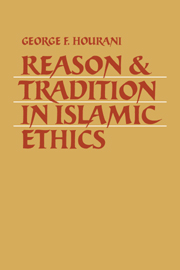Book contents
- Frontmatter
- Contents
- Preface
- Foreword by Michael Marmura
- Conventions
- Titles and locations of the original articles
- Introduction
- 1 Islamic theology and Muslim philosophy
- 2 Ethics in classical Islam: a conspectus
- 3 Ethical presuppositions of the Qurʾān
- 4 ‘Injuring oneself’ in the Qurʾān, in the light of Aristotle
- 5 Two theories of value in early Islam
- 6 Islamic and non-Islamic origin of Muʿtazilite ethical rationalism
- 7 The rationalist ethics of ʿAbd al-Jabbār
- 8 Deliberation in Aristotle and ʿAbd al-Jabbār
- 9 Ashʿarī
- 10 Juwaynī's criticisms of Muʿtazilite ethics
- 11 Ghazālī on the ethics of action
- 12 Reason and revelation in Ibn Ḥazm's ethical thought
- 13 The basis of authority of consensus in Sunnite Islam
- 14 Ibn Sīnā's ‘Essay on the secret of destiny’
- 15 Averroes on good and evil
- 16 Combinations of reason and tradition in Islamic ethics
- Select bibliography
- Index
6 - Islamic and non-Islamic origin of Muʿtazilite ethical rationalism
Published online by Cambridge University Press: 13 October 2009
- Frontmatter
- Contents
- Preface
- Foreword by Michael Marmura
- Conventions
- Titles and locations of the original articles
- Introduction
- 1 Islamic theology and Muslim philosophy
- 2 Ethics in classical Islam: a conspectus
- 3 Ethical presuppositions of the Qurʾān
- 4 ‘Injuring oneself’ in the Qurʾān, in the light of Aristotle
- 5 Two theories of value in early Islam
- 6 Islamic and non-Islamic origin of Muʿtazilite ethical rationalism
- 7 The rationalist ethics of ʿAbd al-Jabbār
- 8 Deliberation in Aristotle and ʿAbd al-Jabbār
- 9 Ashʿarī
- 10 Juwaynī's criticisms of Muʿtazilite ethics
- 11 Ghazālī on the ethics of action
- 12 Reason and revelation in Ibn Ḥazm's ethical thought
- 13 The basis of authority of consensus in Sunnite Islam
- 14 Ibn Sīnā's ‘Essay on the secret of destiny’
- 15 Averroes on good and evil
- 16 Combinations of reason and tradition in Islamic ethics
- Select bibliography
- Index
Summary
The ethical theory of the Muʿtazilites is properly called ‘rationalism’, because it held that the values of human and divine actions are knowable in principle by natural human reason. Since this doctrine and related parts of the theory (mentioned in the next section) were the prevailing ethical theories in the major pre-Islamic religious cultures of Iran and Byzantium, the question easily arises, to what extent were the Muʿtazilites as the first systematic theologians in Islam indebted to these cultures for their ethics?
This question is part of a wider one, that of the origins of systematic theology in Islam (kalām) as a whole. In order to provide a context for my inquiry into the origins of the ethical system, it will be useful to begin with a brief review of the conclusions of scholars on the origins of kalām.
Perhaps it was Maimonides who, more than anyone else, set the tone for early modern views in a famous passage of his Guide of the perplexed:
Know also that all the statements that the men of Islam – both the Muʿtazila and the Ashʿariyya – have made concerning these notions are all of them opinions founded upon premises that are taken over from the books of the Greeks and the Syrians who wished to disagree with the opinions of the philosophers and to reject their statements [after those two nations became Christian]…
- Type
- Chapter
- Information
- Reason and Tradition in Islamic Ethics , pp. 67 - 97Publisher: Cambridge University PressPrint publication year: 1985

